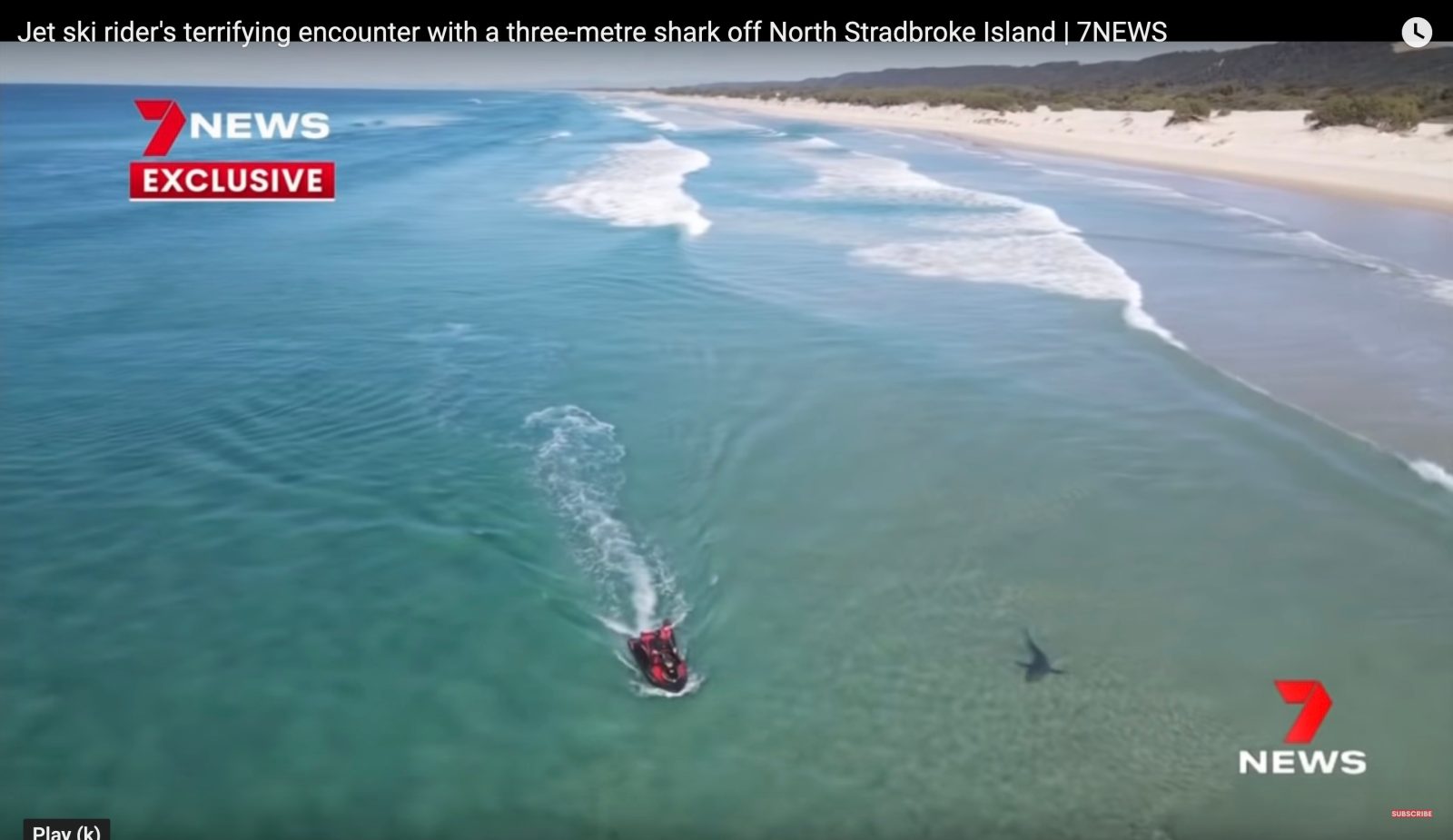
There’s a reason authorities in many countries are issuing new, stern warnings about not operating drones or other equipment around sea birds or animals. Cases of human harassment of wildlife are escalating, often with dramatic effects – as footage taken by a drone of a bull shark attack in Australia seems to demonstrate.
Drone footage of shark attack details jet ski’s prolonged pursuit before
Humans love the fearful frissons that shark attacks provoke, making drone footage of the incidents too horribly compelling to resist (as well as favorite video bait for DroneDJ coverage). But the case of an August 7 strike off the coast of Australia seems to involve more than the usual vulnerable-human-meets-relentless-predator scenario. Indeed drone shots included in a breathless 7News TV report on a 10-foot bull shark going after a jet ski appears to indicate the creature was defending itself after being boxed in by what it considered a harassing pursuer.
The encounter occurred after a pair of friends spotted what turned out to be five sharks just off the coast of Queensland’s North Stradbroke Island. As one set off on his jet ski for a closer look, the other got his drone aloft to capture aerial footage. According to the 7News report, things got hairy when the jet ski “did a couple of circles around one of the sharks, and the animal suddenly turned and attacked.” Another example of the horrifying, bloodthirsty instinct of sharks to devour innocent humans? Maybe not.
Without accusing anyone of anything untoward in the absence of the uncut video, the “couple of circles” seen in online reports look a lot more like repeated, close buzzing of the shark by the vehicle. On a few occasions the creature becomes visible enervated, swiftly darting to get away from it. At one point the jet ski driver pins the shark in close to the beach in very shallow water. The creature does not appear to want any part of the noisy contraption, but also doesn’t seem to be given a lot of choice in the matter.
Shark-jet ski clash may qualify as a wildlife harassment incident now on the rise across the globe
If so, that would qualify for what many marine and park officials around the world define as wildlife harassment. According to the US National Oceanic and Atmospheric Administration, that includes “any act of pursuit, torment, or annoyance that has the potential to injure a marine mammal or marine mammal stock in the wild… (or) have the potential to disturb (but not injure) a marine mammal or marine mammal stock in the wild by disrupting behavioral patterns.”
Some variations of the drone video available online seem to make the herding maneuvers by the jet ski evident – including a very sharp turn quite close to the shark before it struck the vehicle. We’ll allow DroneDJ readers to view those and decide for themselves whether the jet ski was guilty of harassment according to the above definition or not.
To be fair, bull sharks are known to be one of the most aggressive of the species, and have been blamed for a rising number of attacks on the French island of La Réunion that have severely diminished the number of permitted swimming and surfing spots. They are not, however, notorious for hunting and eating large, loud sea craft enshrined in not terribly tasty fiberglass. It is also very uncommon for sharks to do the Jaws number of rising up to gnaw on boats – unless, of course, they’re being frenzied with large quantities of blood and food tossed into the water around them.
There are, therefore, legitimate reasons to ask why it was the Queensland shark finally turned aggressive – and just who was responsible for what coverage of the event has variously described as “shocking,” “terrifying,” or “raging” in its ferocity. It’s worth noting that the strike was limited to the single charge, which thankfully left the jet ski driver uninjured. The event left him impressed – albeit not enough to foreswear a similar outing if the occasion arises again.
“Probably wouldn’t get as close,” the driver says in the 7News report of the lessons he learned from the incident. “Keep a bit more distance between us.”
FTC: We use income earning auto affiliate links. More.




Comments